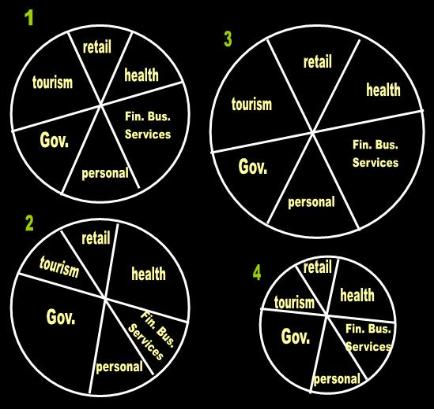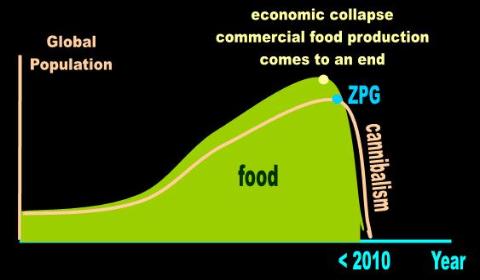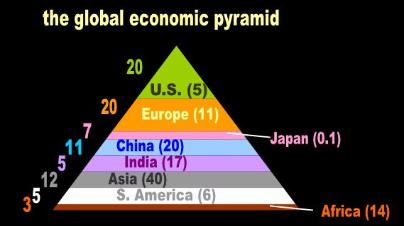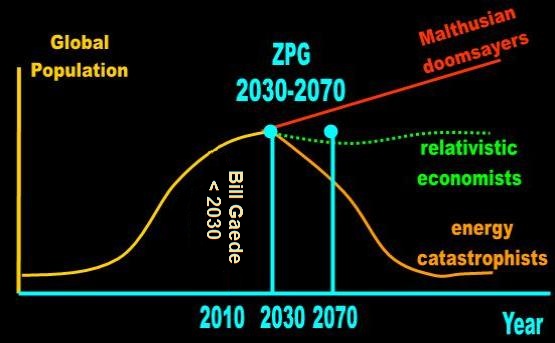| Panic spreads like wildfire |
| Adapted for the Internet from: Why God Doesn't Exist |
- ________________________________________________________________________________________
- Last modified 03/04/08
- Copyright © by Nila Gaede 2008
1.0 The only economy that has a bearing on extinction is the economy of the U.S.
Let's recap what I covered in this module because it is of vital importance to our future.
The United States Economy was built by contributions from every country in the world. Not only did the U.S. siphon off the
best graduates from the universities of the world, but it used its might and resources and diplomatic and secret services to
penetrate and take advantage of most economies in the world. All people in the world are to some degree responsible for
the development of the U.S.
But at some point you must pay the piper. You have to confront reality. The U.S. cannot continue to expand economically
forever and ever at the expense of foreign countries. At some point the countries to which it sells its goods and services
grow up, begin building their infrastructure, and either produce the goods and services themselves or invite multinationals
to do it for them. Either way, this does little for the American worker. This process guarantees the elimination of his job.
Why am I harping on the U.S. Economy? Is this the only economy in the world? Isn't this just misplaced arrogance?
For the purposes of extinction, the U.S. Economy is the only economy that matters. Once the U.S. economic system
disintegrates, the other economies disintegrate with it. This is easily demonstrated. Let's remove the U.S. with a magic
wand. Will the remainder of the world withstand the loss of such an important player? 23% of the European Union's
exports, [1] 21% of China's exports [2] and 18% of India's exports [3] are to the U.S. Over 15% of global exports are to
the U.S. [4] Remove the U.S. from the economic scene and the consequences for the major economies is unthinkable.
Factories and service corporations by the hundreds would close their doors overnight. Remove the U.S. gradually from
the economic scene and the results are just as deadly. The global stock markets tumble in response to the troubled U.S.
market, unemployment rises everywhere, and in a matter of weeks or months a runaway domino effect results in the
unemployment of billions (Fig. 1).


2.0 Can Government or business do anything about the collapse?
The global economy advances so to speak by pulling itself by the bootstraps. At the top of this pyramid we have the
U.S., a relatively empty country (only 300 million people), but contributing to about one fifth (20%) of global GDP. In the
past, the U.S. exported its surplus to underdeveloped nations. Today the situation is reversed. It is other countries
which export to the U.S.
So let's assume that the U.S. Economy crashes one fine day. The stock market disintegrates completely in a very short
time and millions of investors lose their wealth. Stock certificates convert to bathroom tissue. Money has no value. Bill
Gates and Donald Trump are suddenly worth as much as the next guy. Shortly after, the unemployment rate begins to
rise, first gradually, then accelerating until over 60 million of the 100 million workers and employees of the U.S. are out
of work. The masses can no longer pay for mortgages or credit cards. They can't even meet day to day expenses such
as gas, rent and utility bills, or food. The interest rate is at zero, rendering the Fed irrelevant.
The economist will stop me right there. This is an unreasonable assumption, he will say. The scenario I am painting is
out of the question. Not in his or my wildest dreams!
Is it?
Let's first agree that IF the scenario I am painting does occur, we have a major catastrophe on our hands. Not thousands,
but millions of people will be the victims of starvation or cannibalism. This should highlight for you that Man has indeed
placed himself in a very precarious position. We have painted ourselves into a corner. Our very lives now depend on the
fragile, artificial economy we have built. Just imagine what would happen if God decides to play a prank on us and erases
all the information in every computer in the world. The tenderness of our artificial economy is a cause to worry because
if we lose but half of it, we guarantee more deaths than we could account for either disease or atomic weapons. This
seemingly innocent agent or mechanism is the most formidable foe we will face from now on.
Next, let's see if there is anything the Government or private institutions can do to avoid or reverse the collapse of the
economy. After 2001, the U.S. Economy was able grow despite the Twin Tower disaster because people were able to
take low interest loans against the equity of their properties and reinvest the money in real estate or spend it on
consumer goods and services. Massive consumer spending injected badly needed funds into a struggling economy
and fueled it for the next few years. This phenomenon enabled the financial business sector (insurance, credit cards,
banking, brokerage, etc.) to capitalize by as much as 20% in 2004. [5] The boom is now over. The bubble has burst.
The question is, 'What's next?' Was the financial business boom the last trick?
The service sector is divided into several major categories, including: financial business services, government,
tourism (hotels and restaurants, transportation, retail, education, health, and social services, and personal services
(Fig. 2). Which of these is going to be the next boom sector of the U.S. Economy? Is education going to skyrocket?
Is transportation about to explode? Are we going to build thousands of hospitals and clinics all of a sudden and put
millions of doctors to work? Are Walmart, Kmart, and Target going to double their sales to compensate for the disaster
in the financial sector?
The financial business sector -- specifically geared towards the housing market -- was the last unexploited niche of
the U.S. Economy. It predictably reached saturation and is now or soon to be in its last phase. The Government can
give money to consumers or lower the interest rate to zero and it won't make a bit of difference in the long run. Unless
there is another category in the service sector that can do what financial business services did for the economy in
these last four or five years, the U.S. Economy has finally reached a plateau. Barring a couple of genial, yet cosmetic
adjustments here and there, the economy will now be in constant decline. Not a single economist, not a single politician
will be able to do anything about growth because the problem we have before us is by its very nature not cyclical. What
is happening is structural. It was a predictable outcome. In fact, many analysts had already talked about the upcoming
real estate bubble burst. We are now dealing with a structural problem. Intelligence cannot do anything about it.
Fig. 1 |
| % Population vs. % Global GDP The US, Europe, and Japan generate almost half of the world's income. These closely interrelated economies would collapse if any of the other two collapses. If they collapse, the Asian, S. American and African economies become irrelevant. |
Fig. 2 |
3.0 The collapse of the U.S. Economy signals the end for the entire planet
The day the U.S. stock markets collapse, this will be followed shortly by the collapse of the European and Japanese
markets and then by massive unemployment in these three regions. China and India are rapidly saturating their internal
markets as we speak. Where will the now mature corporations of these two countries find outlets for their products?
Where will they find 4 or 5 billion people to buy their products and take the two populous nations to standard of living
levels enjoyed today by the U.S., Japan, and 'old' Europe?
The day the U.S. Economy collapses, China and India will suddenly stop receiving orders from all three developed
regions. This domino effect affects all countries of the world. By wiping out most international trade from all the
economies of the world, each region is now on its own, dependent on its internal market, many of which are already
near saturation. Without a surplus to export, there is no need for workers. Without sales, there is no need for imports.
The service economies disintegrate and there is no need for employees either. In the blink of an eye, money loses its
value as a medium of exchange.
If the entire economy collapses, will the agricultural corporations be the only ones working?
The agricultural corporations are a small, but crucial component of the economy of any country. In fact, they are the
most important sector and nobody is particularly aware of this. We take food too much for granted, in great measure,
because we have it at our tables at all times and with little effort. However, in the absence of profits (money), the
agri-corporations have no incentives to produce food. The farming companies will have to lay off people just like any
other business. It is not subsistence farmers that work for agricultural corporations. The people who sow, spray, and
harvest are blue collar workers just like their colleagues in the factories. The rural worker works because he gets paid
and can use this money to buy goods and services.
Nevertheless, the distribution and sales mechanisms have collapsed as well. Recall that there are three layers
necessary to provide food to urbanites. Without an influx of food, the people stranded in the cities and towns have
about as much food as you find in a desert.
The day that commercial production of food comes to an end, the carrying capacity of Man reverts to whatever we
have produced up to that point. In no time, we find ourselves in a situation where the many chase the few. The
ecological pyramid is inverted. This process goes through three phases. First the urban masses scrounge what
they can get, even from trashcans. Then, they look around for people that have died. In the final stage, the hardiest
don't wait for people to die. In a matter of weeks at most, the population of the world is depleted.
Note that this entire process is no different than what did away with the dinosaurs (Fig. 3). Mass extinctions all end
the same way. Intelligence and technology have no power or authority to reverse the end result. A mass extinction
is ultimately a consequence of population density and density dependent birth rates. Intelligence and technology
can't do anything about either.
The Government has no way to stimulate a service economy like it did during the Depression Era with the
manufacturing economy. Is the Government going to open bank accounts or ask for personal loans at credit
institutions? Is the Government going to stimulate the service sector by demanding more haircuts? Will it artificially
increase the number of government employees? How is this different than giving everyone a check just to stay at
home? If it is this easy, why don't governments do it today? Let's everyone stay at home and let the robots do all
our work! Why, if this is the solution, does government worry about unemployment at all?
How about you? What are you going to offer when the service economy reaches its end? Are you going to offer
your services as a barber or as a prostitute? For what? For money? For a TV set? Or for food? Whatever you are
willing to part with, whatever skill you have will be worth zip when matched against food. We revert to a natural
economy. In a natural economy, the only thing of value is food. There is no such thing as trade or commerce in a
natural economy. Ask the lion. Ask a whale. Or ask your dog. The day that our artificial economy collapses, we
finally take the veil from our eyes and realize the magnitude of the fake world we created. We finally realize that
we are just another animal in the wild kingdom.
Will the economic collapse happen this year?
My point is that the disintegration of the U.S. Economy can happen at any moment now. When that happens, every
person on the planet has just been told by the doctor that he or she has a few months at most to live.
4.0 Surely, there is something the Government can do?
Could there be something the Government can do that I haven't thought about?
The U.S. Government can give money to consumers so that they go out and spend it on goods and services and
jump start the economy again. What happens after the Government gives handouts and people spend it? Will such
measures spark massive hiring? Will the economy return to a regime of strong growth again? The central bank can
lower the interest rate to zero. After that, the Fed is essentially irrelevant. Will lowering the interest rate to zero
compel millions of homeowners to go out and borrow money? What will they use as collateral? Their devalued
houses? But assuming they do, this also has to be a short-lived solution. The American real estate craze is over.
Having lost much of their value, houses can no longer be used as debit or credit cards, at least not by nearly half
as many people as used this tool to their advantage during the boom. What will get the value of properties to rise
again? Even foreign investors are now going to think twice before they invest in U.S. properties. Real estate was
the main reason for the growth in financial business services. Without the vital real estate segment, the financial
business services sector never again rises either.
Maybe the Government or the Fed have another pair of aces up their sleeves.
Yes. We are a very versatile and obstinate species. But how long would these measures last? In order to guarantee
sustained growth for a few years, American businesses need to find a billion or two billion people with money
somewhere to sell their surplus goods and services. The U.S. already found and developed China and India.
South America and Africa are not as populated and most markets are approaching saturation for the goods and
services these regions can afford. The U.S. will now have to use the astronomers' telescopes if it wants to find new
markets.
| The service sector is divided into the same categories it always had. One category can increase only at the expense of another. Therefore, if we increase Gov and health (1 to 2), this can happen only at the expense of tourism and Fin Bus Services, for example. If in addition, the entire pie shrinks (3 to 4), people are simply out of work and have no manner of sustaining themselves. |
Fig. 3 |
| 1. The Malthusian doomsayers worry that we will not be able to control the ongoing population explosion. They argue that we are polluting the environment or killing off species too quickly. As a result we have climate change, loss of diversity, etc. These idiots need to learn the Law of Density Dependent Birth Rates. Climate change has had no bearing on any extinction in the history of Earth. 2. The Simon and Friedman idiots of Economics believe that any number of people can be sustained at any time. Everything is just a matter of price. The relativist economist believes that we are going to startrek to the galaxies or convert into posthumans if an asteroid doesn't destroy us first. He places all his bets on technology. These are the biggest idiots ever to walk upon the face of the Earth. 3. Many energy catastrophists are Malthusian doomsayers in disguise. They also believe that we are too many. However, their argument is that we are depleting our energy resources. They don't believe in extinction. They believe that some people will survive the upcoming colapse and restart the human race. 4. I will make it simple and transparent for you. Once the US economy collapses, the global economy collapses. That same day, money is worth zip. What are you going to trade for food if food is all that has value? What follows is starvation and cannibalism. That's how all mass extinctions end. A mass extinction is by definition a gargantuan economic collapse. It happened at the end of the Permian. It happened to the dinos. It will happen to us VERY soon. |


- Module main page: How the last human died
Pages in this module:

